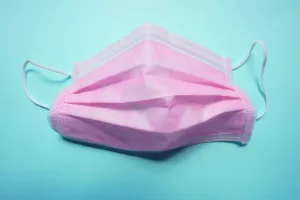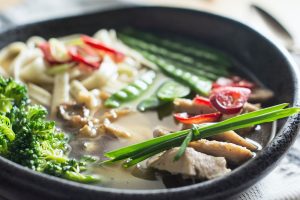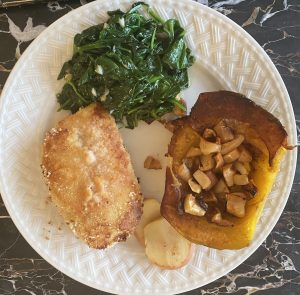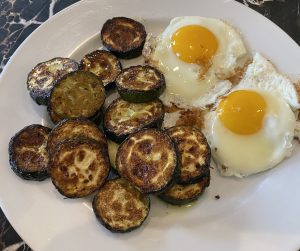Allergies
Boosting Immunity for This Covid Wave

It’s that time again, everyone: Covid Wave! In fact, I believe I’m late to the party, as this seems to have been going around for the past month now, thereby underscoring once again one of the many differences between Covid and the flu, as I have no recollection of any flu waves between July and August.
From a CM perspective, I suspect the incredible heat and humidity of July likely played a part in this, as coronavirus thrives in damper environments—recall in 2020 overweight men with pre-existing pulmonary issues were some of the most vulnerable candidates.
In light of the recent wave, I’ve had many people ask me what they can do to boost or juice their immune system, to which my first and foremost answer is one people don’t want to hear: Eat and sleep healthy.
“No, you idiot! I’m looking for a supplement. What can I take?”
Fair enough, but truthfully, I don’t believe there is anything better for immune support than regular moderate exercise, early bedtimes, adequate sleep, and three cooked meals a day with plenty of vegetables and some animal protein. Not to mention that from our perspective, the best thing you can take to boost immune function, or any bodily function, is an individualized, holistic formula, tailor-written to your pattern. Anything less will be precisely that, and if carelessly prescribed or taken in excess, can potentially cause subtle harm. With that said, there are empirical things we can do or take heading into cold and flu season seemingly a bit early this year.
- Regular acupuncture, or moxibustion treatments on the upper back, over the lungs, has been extensively studied and proven to boost immune function: https://www.frontiersin.org/journals/integrative-neuroscience/articles/10.3389/fnint.2019.00048/full
- A good multi-vitamin I think is advisable for all of us.
- Zinc is fine to take in intermittent cycles, but too much of it can cause stomach upset, as zinc has cold properties, which is why it can be useful for heat in the throat and lungs.
- Vitamin D can also be beneficial, but I recommend getting your levels tested before mindlessly supplementing.
- Mushrooms are also fine in intermittent cycles, however mushrooms are inherently damp, so should be taken cautiously by people with weight problems, over-sized tongues, or thick coatings on their tongues. For these I recommend Paul Stamets brand: https://fungi.com/collections/host-defense. For all other supplements I recommend Pure Encapsulations or Thorne.
As always, if you get Covid please call for a virtual herbal consultation, as I have no idea how anyone gets a full resolution from this pathogen without Chinese herbs. In my observation there have been many people who think they got a full resolution, but quite apparently did not based on their symptoms. Chinese medicine is the only medicine with the concept and diagnosis of “unresolved exterior pathogen,” and subsequently with the treatment principle of “releasing the exterior,” in reference to venting a virus to actual completion. If you choose not to take Chinese herbs, at least rest and recover, eat well, and do not exercise while sick.
Spring is “Shao Yang” Season!

As I made my way this Monday through my ten-block, 2 ½ avenue walk from Penn Station to the office, the 41-degree winds whipping into my face, masquerading as 30 degrees, that lovely sweatshirt-only, spring day of the previous weekend felt like ancient history, only to return like an overdue hug on Tuesday.
Even on these open-air, warm days, I’m cynically aware of what they ares. A tease, a mere foreshadowing of the still relatively distant future, a glimpse into a climate we may or may not experience each year, and for the next several weeks one that will rear its head only sporadically, thereby confusing our wardrobes and forcing us to check the weather app daily.
Spring corresponds with the wood element in Chinese medicine, which corresponds with the gallbladder meridian, or shao yang layer of health and disease.
At their root, “shao yang pathologies,” which can be anything from gastrointestinal to neurological, emotional, autoimmune, or otherwise, are said to be caused by “dry,” or weak guts. Vulnerability in metabolism leads to inflammation that flares upwards, commonly manifesting in symptoms such as chest tightness, throat dryness, eye dryness, most dryness, headaches, etc.
“Heat above, Cold below,” as we call it, which really just means the “cold” or weak microbiome has caused substances that should have descended as stool or urine to rise in the form of inflammation and harass upper portions of the body. One of the most signature symptoms of a shao yang pathology is the experience some have of alternating heat and cold sensations. So, while we can probably blame much of spring’s recently more chaotic, unpredictable nature on global warming, there is systemic logic to it. We might even acknowledge that in spite of our ongoing environmental crisis, spring is still the only season that consistently behaves so erratically. And erratic… is shao yang. Even the “shao yang pulse,” is signified by being ever-changing. One minute it feels wiry and rapid under the clinician’s finger—the next it’s like a slippery little ball. As my teacher would say: “This person is ‘shao yang’.”
How to temper our internal and external shao yang challenges? Simple and same as always really: Warm, easily digestible foods, and early bedtimes.
Soups and stews, congees, eggs, and steamed vegetables are light on the gut. They should generate healthy metabolic fluids and are less likely to create inflammation. This will address the “cold below.” As for the “heat above,” early bedtimes will modulate neurotransmitters and maximize the kind of organ recovery that can be attained only through a good night’s sleep (and/or Chinese herbs).
Err on wardrobe for the calendar more than the forecast, obviously within reason. Our bodies are still considered “cold” from the half year of cold, so all the youthful “heat pathologies” walking around outside in cut-off belly shirts cut low again on top will be more vulnerable to viruses.
Exercise should be consistent, but moderate. Regular enough to quell the heat above, but mindful to not sweat so much as to weaken the cold below. If you’re aiming to have the beach body ready for summer, the best way is by avoiding gluten, dairy, sugar, and raw foods, along with mild core workouts.
Finally, the wood element of spring is most supported by the sour flavor, so this is a good time of year to add foods like lemon and vinegar to your daily intake. Although they are uncooked, pickled foods, such as sauerkraut or kimchi are good to have alongside your warm meal, as they help to prevent the “shao yang stomach.”
Happy Shao Yang Season, everyone!
Sprained Ankle Remedy: The Follow-Up
I want to begin this week’s newsletter by clarifying and/or elaborating on the previous. This is just part of the reason I appreciate and enjoy replies and feedback. The latter as it serves keep in touch with old friends—the former as it gives me the opportunity to improve my communication in educating people about Chinese Medicine.

Several people responded to my miraculous sprained ankle healing story with inquiries to whether they could or should use the same topical for their own chronic pain; which told me I fell a bit short in my explanation.
The external application I used for my acute injury, San Huang San, contains herbs that are very blood-invigorating, which can be good for most forms of pain, but also very COLD, which is only advisable in the very first stage of an acute injury. Past that interim, San Huang San would most likely do more harm than good (just like ice), as in contrast to allopathic medicine we offer no one-size-fits-all remedy for a particular symptom, i.e. Pain/Inflammation.
The same principle applies to internal medicine, as people have come into the clinic asking for “the herb for weight loss,” or “the herb for high blood pressure.” There is no such thing, and if an acupuncturist ever tells you or prescribes otherwise, run. From our perspective, either of these pathologies can be a result of different dysfunctions in different organ systems within each person. While in one case we may have to strengthen the lungs’ circulatory function and remove fluid retention from the urogenital microbiome, in another we might have to remove fluid from the gastrointestinal microbiome and sedate pulmonary function. Very different diagnoses and prescriptions.
For chronic pain the best things people can do, in my opinion, are yoga, qi gong, or pilates. Without a daily, or at minimum weekly routine, I can’t imagine how it is humanly possible to live without pain or discomfort. Topically, what I am presently using in the clinic and seeing best results with is a more warming analgesic liniment, nicknamed “Evil Bone Water”—bottles available upon request at my office.
As the weather in the northeast has suddenly shifted from very warm to cold and pouring rain it is common for people to be more vulnerable to viruses or exacerbations of musculoskeletal pain. The warm weather opens our pores and dilates our blood vessels, and we wake up the next morning and must go outside into the cold rain, which has greater opportunity to “enter” and exacerbate pre-exiting “dampness” at the neuromuscular or immunological layers.
This is why during this time of year it is especially important to dress relatively warm (I can’t tell you how many girls I’ve seen in cutoff belly shirts and guys I’ve seen outside jogging topless, both of which just begging for pathological dampness!), avoid raw foods, and eat ginger, garlic, and onions. This past weekend of torrential downpour we made a chicken soup cooked in chicken bone broth, with the typical accoutrement, chopped celery, carrots, potato, onion, garlic, and ginger, with quinoa cooked separately so as to add to the many leftover portions to come. Rice or noodles are a fine substitution here, but as we consume plenty of both in our home, I like to occasionally honor the western nutritional perspective as well.
I hope everyone is now a bit clearer on what San Huang San is, why it worked so well for me, but likely would not for you presently. However, there are other options for chronic pain, such as the now widely renowned in my world, “Evil Bone Water,” as well as the always advisable diet and exercise. Wishing everyone a pain and virus free week, in spite of this proverbial cold, wet rag that temporarily surrounds us.
How to Design Meals like Medicinal Formulas
 If food is medicine then creating each meal should be a bit like writing your own herbal formula. Whenever possible, it should be as agreeable as possible with our unique physiology, though this is admittedly challenging when cooking for a family where everyone has different body types. Nevertheless, one part of each meal should complement the other parts, either through synergistic benefit or offsetting its potentially detrimental qualities.
If food is medicine then creating each meal should be a bit like writing your own herbal formula. Whenever possible, it should be as agreeable as possible with our unique physiology, though this is admittedly challenging when cooking for a family where everyone has different body types. Nevertheless, one part of each meal should complement the other parts, either through synergistic benefit or offsetting its potentially detrimental qualities.
As a longstanding, traditional example, any time we get Thai or Mexican food, it is served with cucumber or radishes, respectively, which are there to mitigate the side effects of the spice.
Most foods are good, but almost all of them have “side effects.” Red meat nourishes the body’s blood, yin, and qi, but if it were an herb it would be a bit warm and damp. Too much red meat and/or red meat that is not harmonized by the remainder of the meal can create damp heat, or inflammation in the stomach and intestines. Then again too little red meat can cause a deficiency of blood, yin, and qi. Ideally red meat (and pork) would be consumed alongside steamed vegetables, then followed by hot green tea, either after the meal or the following morning (green tea at other times and/or for vegetarians is thought to have a bit too cooling, or vasoconstrictive effect on the microbiome—for them black teas are preferable).
Carbohydrates are settling for both the stomach and the mind—probably why they give us such immediately pleasure—but they are obviously stickier foods, “damper” foods, which are more difficult to digest. For this reason whenever possible, it is best to eat them warm and cooked, and alongside more acrid spices in the meal, such as basil, rosemary, ginger, garlic, or onion. While I am Jewish and from New York, and love a great tuna on a bagel, there is a remarkable difference in the physiological response to cold tuna on bread versus cooked pasta with garlic and oil, maybe vegetables and cannelini beans. Yum!
Salads. Oh boy, do westerners love salad. Frankly, if you tend to any digestive problems whatsoever, raw foods should be avoided as much as possible, but if you must:
Consume salad more in summer—less in winter—and always alongside some cooked protein and/or ginger tea. The acridity of the ginger should help to warm the stomach to digest the raw foods. The protein should provide warmth, plus some much needed calories, or “qi and yin.”
Cooked vegetables, allergies notwithstanding, are probably the only perfect food that wholly lack side effects, which is probably why they are also the one food that nearly every paradigm of medicine agrees upon. If you don’t consume cooked vegetables daily you are on a dangerous path, in my opinion. They are nearly always harmless and beneficial… yet still ultimately inadequate, as we can only imagine the metabolic fatigue and inevitable illnesses to come were someone to consume exclusively vegetables.
Food is a gentle medicinal. It will neither heal nor destroy us quickly on its own, however it will always do one or the other over time. I’ve seen firsthand, in myself, loved ones, and patients eradicate chronic symptoms by pursuing a more Eastern diet, though it took many months—in my case years! People should not get discouraged by eating well for a particular interim and not feeling dramatically better. Instead, pay attention to whether you feel worse (always a possibility), meanwhile recognizing that without internal medicine, diet alone may take a long time to cure disease. It is up to us to continue to better understand the nature of each food, so that we can wisely design the perfect “herbal formula” three times a day until the end of time.
Pictured above is an imperfect, but still great meal: Breaded chicken cutlet, sauteed spinach, and roasted acorn squash with roasted apples, cinnamon, and maple syrup. What is “imperfect” about it? First, fruit should be consumed at least 15 minutes apart from other foods so as to avoid creating its notoriously mucus-like congestion in the microbiome. Also, “natural” or not, let’s be honest: maple syrup is sugar; and chicken is healthier without breadcrumbs. On the other hand, breadcrumbs make up a very small amount of the meal, the apples are at least cooked, hence easier to digest, and the leafy greens with garlic should help to optimally process the meat and sugars.
Breakfast Idea: Eastern Nutrition

Patients often ask me what they should eat for breakfast. Most Americans are conditioned to either skip breakfast, have something simple and unhealthy like a bagel or toast, or something “healthy” like yogurt or smoothies. While the latter might check off as such within the context of a scientific laboratory, obviously Eastern Medicines hold that uncooked foods are more difficult to digest, thereby ultimately providing us with less nutrients, in spite of having maybe started with more on the grocery shelf.
While going through Chinese Medical school my own microbiome was a minor disaster, and one of my teachers who was treating me at the time requested I eat sweet potatoes (with my eggs) for breakfast.
“You want me to eat Thanksgiving for breakfast?” I asked. He laughed and asked if I’d ever had eggs with hash browns or french fries. Of course I had, countless times.
He rhetorically asked me what the difference was —if I chopped sweet potatoes in the same way as hash browns, even adding onions to my liking. For years to follow sweet potatoes became my daily breakfast. And many of my health issues gradually improved during that time.
I became perpetually more educated in health and self-care, also about food itself. I learned that sweet potatoes are not in season for the majority of the year, which means during those periods they are, a) not as much what my body needs, and b) likely lacking in their maximum nutrients. From yams it was an easy transition to exploring other vegetables as side dishes with breakfast, which I realized was a good way to get in some daily recommended portions of greens from the start.
For many years now my breakfast has been eggs with a cooked, in-season vegetable, and would struggle to imagine starting the day any other way. In the Winter we eat a variety of root vegetables—whether roasted potatoes, carrots, radishes, or turnips—in Summer it’s more leafy greens. As for the ongoing, raging egg debate, now reignited by many functional medicine docs, all I can say is I’ve eaten eggs every single day for decades. I don’t doubt some peoples’ allergies to them, in which case they should surely avoid until that allergy is rectified. For the rest of us eggs provide invaluable nutrients in a very light, easily metabolized way. In Chinese Medicine they are said to nourish the blood, so much so that the yolk is even an ingredient in the herbal formula, “Huang Lian E Jiao Tang,” which is used to clear inflammatory heat that exists as a result of healthy systemic fluid deficiency. This “blood” benefit is probably why eggs are so highly recommended by many holistic fertility doctors.
EGGS AND “ZUCCH” (as my daughter calls it)
- Pre-heat oven to 375
- Slice squash however you like it, leave all of the slices on the cutting board, and lightly sprinkle them with salt. Let them rest for about 10 minutes (or longer) so that their excess water gets sweated out, then pat them dry.
- Add to pan with olive oil, sprinkle with salt, pepper, and whatever seasonings you like.
- Cook for 15-20 minutes, turning them over once in the middle to roast both sides
- Once almost finished cook your eggs to your liking.
- Drizzle a nice olive oil on top of them once plated

